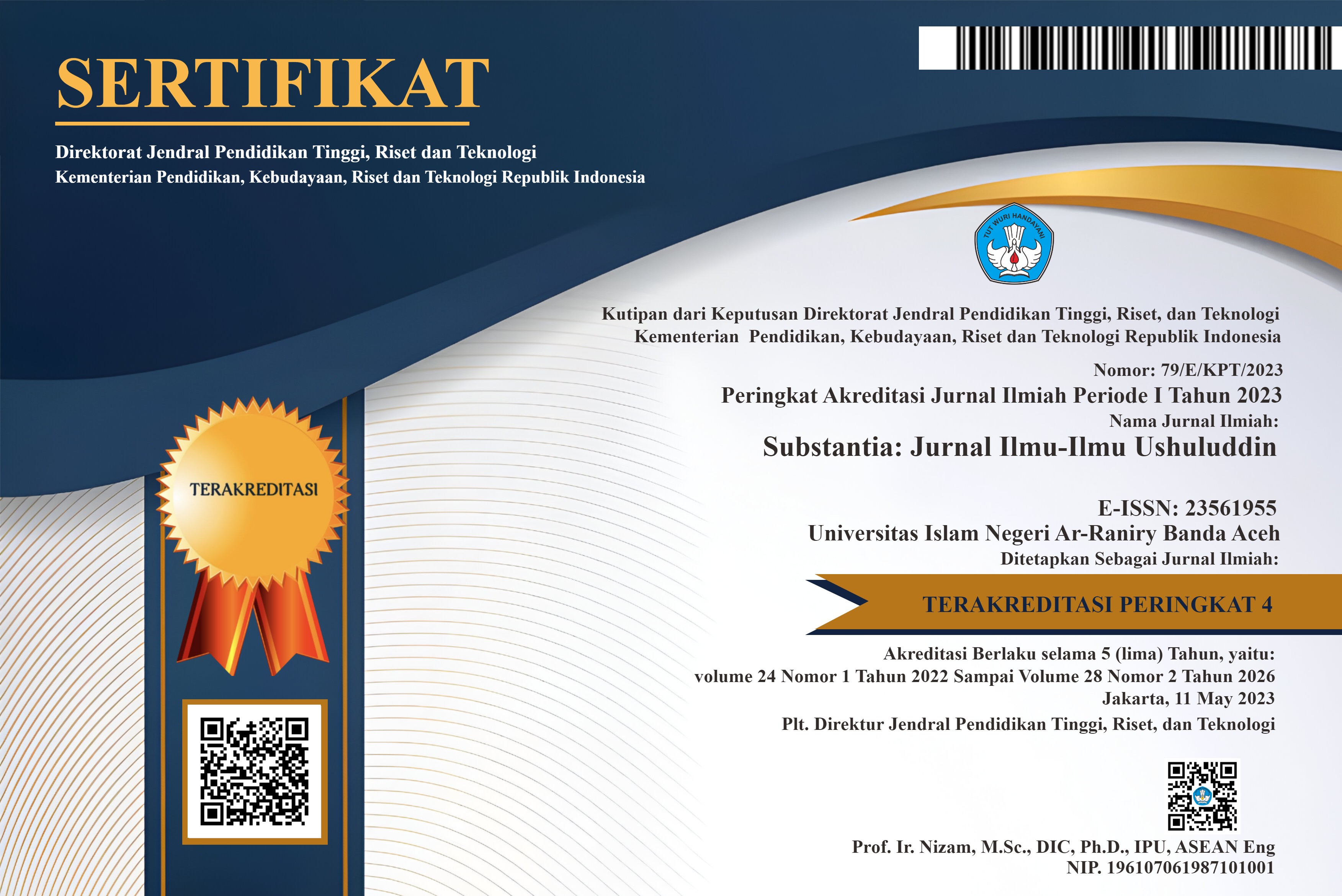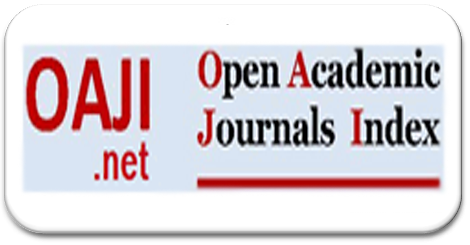The Interpretasion of “Wa-‘Allama Ādama Al-Asmā’a Kulla-Hā” (Qs. 2: 31) and its Relation with the Issue of the Origin of Language; Study Text of al-Ùabarī’s, al-Zamakhsharī’s and al-Rāzī’s Commentary on the Qur’ān
Abstract
This paper will describe the interpretation of the verse 31, and its relation with the issue of the origin of langguage, from three selected commentaries, namely; Jāmi‘ al-Bayān ‘an Ta’wīl āy al-Qur’ān, al-Kashshāf ‘an ×aqā’iq al-Tanzīl, and MafātīÍ al-Ghaib. A close reading of these tree commentaries reveals that there are two interpretation of the word al-asma‘; first, it means every single word that signifies a meaning: nouns, verbs or particle i.e. the names of everything: angels, humans, animals, and inanimate existent includes its qualities, properties and everything relates to objects. This was the same to saying that God had taught Ādam language in its totality. Al-Zamakhsharī and al-Rāzī believe the verse demonstrates that God taught Ādam every language. But unlike al-Zamakhsharī, who seems to suggest that God was pointing to the objects and naming them, al-Rāzī does not explain how this process occurred, whether God educated him or thrown a knowledge (the understanding of language) into his mind. Second, al-Ùabarī who interprets it in a narrow meaning: al-asma‘ means the names of the angels and Ādam’s sons, seems to suggest that God just taught Ādam some languages.
Abstrak: Tulisan ini akan mendiskusikan penafsiran dari ayat 31 dan kaitannya dengan isu asal mula bahasa, dari tiga kitab tafsir yaitu: Jāmi‘al-Bayān ‘an Ta’wīl āy al-Qur’ān, al-Kashshāf ‘an ×aqā’iq al-Tanzīl, and MafātīÍ al-Ghaib. Berdasarkan penafsiran dari ketiga kitab tafsir ini ditemukan bahwa terdapat dua pemahaman dari lafaz al-asma’. Pertama; meliputi semua kata yang menunjukkan kepada makna baik kata benda, kata kerja atau partikel dan lain sebagainya. Yakni meliputi nama segala sesuatu termasuk malaikat, manusia, binatang maupun benda mati termasuk kualitas, sifat dan semuanya yang berhubungan dengan objek. Ini bermakna bahwa Allah telah mengajarkan Ódam bahasa secara keseluruhan. Al-Zamakhsharī and al-Rāzī berpendapat, ayat menjelaskan bahwa Allah mengajarkan Ódam semua Bahasa. Namun berbeda dengan al-Zamakhsharī yang nampaknya menerangkan bahwa Allah mengajarkan Ódam dengan menunjuk kepada benda kemudian menamainya, al-Rāzī tidak menjelaskan bagaimana proses itu berlangsung, apakah Allah mengajarkan Ódam atau mengilhamkan pengetahuan kepadanya. Kedua, al-Tabari yang menafsirkan ayat dengan makna yang lebih sempit, di mana al-asma’ pada ayat bermakna nama-nama malaikat dan anak-anak Ódam terkesan memahaminya bahwa Allah mengajarkan Ódam hanya sebagian bahasa saja.
Full Text:
PDFReferences
Al-Dhahaby, MuÍammad ×usayn Al-Tafsīr wa al-Mufassirūn. al-Qāhirah: Maktabah Wahbah, 1995.
Al-Ghazālī, Abu ×āmid. Al-MustaÎfā fī ‘Ilm al-’UÎūl. Bayrūt: Dar al-Kutub al-‘Ilmīyah, 1983.
Al-Jabbar, ‘Abd. Al-Mughnī fi Abwāb al-Tawhīd wa al-‘Adl. Ed. Mahmud MuÍammad al-HuÌayrī. Cairo: Al-Firaq al-Islamiyya, 1965.
Al-Mālīky, MuÍammad. Dirāsah al-Ùabarī li l-Ma‘nā min Khilāli Tafsīrihi: Jāmi‘ al-Bayān ‘an Ta’wīl āy al-Qur’ān. al- Maghrib: Wizārah al-’Awqāf wa al-Syu’ūn al-’Islāmiyyah, 1996.
Al-Rāzī, Fakhr al-Din. Al-MaÍÎūl fī ‘Ilmi ’UÎūl al-Fiqh. Ed. Ùaha Jābir FiyāÌ al-‘Ulwāny. Saudi Arabia: Imam MuÍammad bin Sa‘ūd Islamic University, 1979.
Al-Rāzī, Fakhr al-Din. Lawāmi‘ al-Bayyināt SharÍ Asmā‘ Allāh Ta‘ālā wa al-Îifāt. Bayrūt: Dar al-Kitāb al-‘Arabī, 1990.
Al-Rāzī, Fakhr al-Din. MafātīÍ al-Ghayb. MiÎr: al-MaÏba‘ah al-Bahīyah al-MiÎrīyah, 1934-38.
Al-Rūmī, Yāqūt ibn ‘Abd al-×amawī. Irshād al-Arīb ilā Ma‘rifat al-Adīb. Ed. D. S. Marjuliyūth. Cairo: MaÏba’ah Hindīyah, 1923-21.
Al-Ùabarī, Abu Ja‘far MuÍammad b. Jarī. Jāmi‘ al-Bayān ‘an Ta’wīl āy al-Qur’ān. Bayrūt, Lubnān: Dār al-Ma‘rifah, 1986-87.
Al-ÙabÏabā’iy, Walīd Musā‘id. Al-Tafsīr wa Manāhij al-Mufassirīn. Kuwayt: Dār al-Tajdīd, 1994.
‘Aly, ‘Abdullah Yūsuf. Tarjamah Ma‘āny al-Qurān al-Karīm bi-l Injilīziyyah. Amerika: Amana Corporation, 1994.
Al-Zamakhsharī, Mahmūd b. ‘Umar b. MuÍammad al-Kashāf ‘an ×aqā’iq GhawāmiÌal-Tanzīl wa-‘Uyūn al-Aqāwīl fi Wujūh al-Ta’wīl. Ed. ‘Ādil AÍmad ‘Abd al-Maujūd and ‘Alī MuÍammad Mu’awwaÌ. al-Riyād: Maktabat al-’Ubaykān, 1998.
Anawati, G.C. “Fakhr al-Dīn al-Rāzī.” Encyclopaedia of Islam. Brill Online: Mcgill University Library.
Bosworth, C.E. “al-Ùabarī, Abū Ja‘far MuÍammad b. Jarīr b. Yazīd.” Encyclopaedia of Islam. Brill Online: Mcgill University Library.
Jansen, J. J. G. The Interpretation of Qur’ān in Modern Egypt. Leiden: E. J. Brill, 1974.
Lane, Andre J. A Traditional Mu‘tazilite Qur’ān Commentary: The Kashshaāf of Jār Allah al-Zamakhsharī. Leiden, Boston: Brill, 2006.
Madelung, W. “al-Zamakhsharī, Abu ‘l- Qāsim MaÍmud b. ‘Ūmar.” Encyclopaedia of Islam. Brill Online: Mcgill University Library.
Smith, Jane I. An Historical and Semantic Study of term Islam, as Seen in a Sequence of Qur’ān Commentaries. Missoula, Montana: Scholars Press, 1975.
DOI: http://dx.doi.org/10.22373/substantia.v18i0.8981
Refbacks
- There are currently no refbacks.
Copyright (c) 2016 Nurullah Nurullah

This work is licensed under a Creative Commons Attribution-NonCommercial 4.0 International License.
SUBSTANTIA: JURNAL ILMU-ILMU USHULUDDIN
DITERBIKAN OLEH:
FAKULTAS USHULUDDIN DAN FILSAFAT
UNIVERSITAS ISLAM NEGERI (UIN) AR-RANIRY BANDA ACEH, ACEH INDONESIA
ALAMAT REDAKSI:
Gedung Fakultas Ushuluddin Lantai II, Fakultas Ushuluddin, UIN Ar-Raniry, Jln. Lingkar Kampus, Kopelma Darussalam Banda Aceh, Aceh 23111.Telp. (0651)7551295. eMail: substantia.adm@gmail.com

This work is licensed under a Creative Commons Attribution-NonCommercial 4.0 International License.


.png)




















